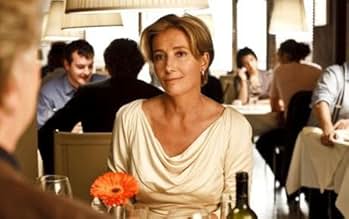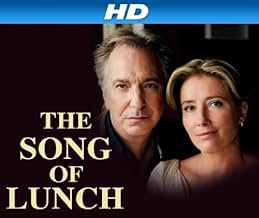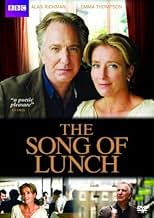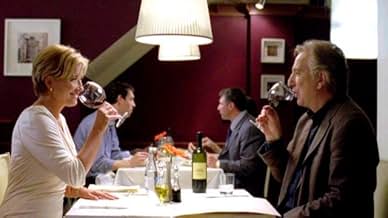The Song of Lunch
- Fernsehfilm
- 2010
- 50 Min.
IMDb-BEWERTUNG
7,3/10
2709
IHRE BEWERTUNG
Füge eine Handlung in deiner Sprache hinzuA London publisher recounts a lunchtime reunion with a former lover, in poetic monologue.A London publisher recounts a lunchtime reunion with a former lover, in poetic monologue.A London publisher recounts a lunchtime reunion with a former lover, in poetic monologue.
- Regie
- Drehbuch
- Hauptbesetzung
- Für 1 Primetime Emmy nominiert
- 4 Nominierungen insgesamt
Christian Wolf-La'Moy
- Advertising Guy Talking with Massimo
- (Nicht genannt)
Empfohlene Bewertungen
I sat down to watch this for a second time in years and was immediately pulled in again by the clever vitriol of the male character with his witty and brutally honest musings. He is wasted potential personified, recognizing many of his own failings - right up to the point of changing anything, which he refuses to do. It's just easier to curl up around a bitter glass of restaurant chianti and bleat on about how all change is for the worse.
Joining him at the restaurant, the woman breezes into the picture, all lightness and controlled gladness - the picture of elegance and change personified. She is genuinely happy to see him and ready to scoop him into a reminiscence of nostalgic affection but he won't let go of his anger at her leaving him. He refuses to truly see himself and twists their reunion into an internal pity party that manifests in leers and snide comments. And still, he is somehow a sympathetic character (oh thank you, Alan Rickman). You understand her affectionate regard, but also her healthy detachment.
The poem is fascinating and the screenplay adaptation is practically perfect in every way. The beautiful photography and luscious sound editing propels this poem into an incarnate, omnisensory, and very human experience.
Joining him at the restaurant, the woman breezes into the picture, all lightness and controlled gladness - the picture of elegance and change personified. She is genuinely happy to see him and ready to scoop him into a reminiscence of nostalgic affection but he won't let go of his anger at her leaving him. He refuses to truly see himself and twists their reunion into an internal pity party that manifests in leers and snide comments. And still, he is somehow a sympathetic character (oh thank you, Alan Rickman). You understand her affectionate regard, but also her healthy detachment.
The poem is fascinating and the screenplay adaptation is practically perfect in every way. The beautiful photography and luscious sound editing propels this poem into an incarnate, omnisensory, and very human experience.
This film is not going to be for everyone. I knew that just five minutes in. But I loved it. The poem, the dialogue, the acting. Any lesser actors than these two could not have pulled it off. It is heartbreaking, because fairly early in, it becomes clear that someone has a problem and it is this issue, along with other feelings of inadequacy that is the true root of their relationship's demise. What is especially interesting is the fact that the viewer doesn't despise Rickman's character--rather, feels his humiliation and loss.
I gave the film eight stars rather than 10, because unresolved for me is the "WHY" of it. Why does he ask her to meet him for lunch to begin with? Is it to punish her? To rekindle something? Is the scene outside the apartment in Paris meant to illustrate obsession? Why does she agree to meet? Is she just being kind? If so--then why is she so cruel in her assessment of his book? The motivation/impetus for this lunch feels unclear to me.
I gave the film eight stars rather than 10, because unresolved for me is the "WHY" of it. Why does he ask her to meet him for lunch to begin with? Is it to punish her? To rekindle something? Is the scene outside the apartment in Paris meant to illustrate obsession? Why does she agree to meet? Is she just being kind? If so--then why is she so cruel in her assessment of his book? The motivation/impetus for this lunch feels unclear to me.
Alan Rickman plays a jaded publisher meeting a past flame (Emma Thompson) at an old haunt, now impersonally renovated. The publisher has a one-track mind and views her every move as erotic.
This is a dramatised narrative poem. I'm sceptical about modern poetry but this one's quite good. It may be familiar ground but a lot of the phrases are actually quite good: consciously poetic but a concise description. Fans of Alan Rickman might find it hard to control himself as his character is aroused by everything: a squeezed hand, a glass of wine meeting his lips, a comely waitress, even a pepper shaker. The story is told through his perspective, much of it as voice-over. The switch between voice-over and dialogue really works, creating tension and drama in what is a fairly undramatic scene. It's like a short play.
Both Rickman and Thompson speak the blank verse (with the occasional rhyme) very naturally. Their characters are intellectual people and the talk comes naturally to them, particularly Rickman's emotionally/creatively/sexually frustrated character.
It's only 50 minutes so it's worth a watch. It would have been nice if it were part of a series of poems.
This is a dramatised narrative poem. I'm sceptical about modern poetry but this one's quite good. It may be familiar ground but a lot of the phrases are actually quite good: consciously poetic but a concise description. Fans of Alan Rickman might find it hard to control himself as his character is aroused by everything: a squeezed hand, a glass of wine meeting his lips, a comely waitress, even a pepper shaker. The story is told through his perspective, much of it as voice-over. The switch between voice-over and dialogue really works, creating tension and drama in what is a fairly undramatic scene. It's like a short play.
Both Rickman and Thompson speak the blank verse (with the occasional rhyme) very naturally. Their characters are intellectual people and the talk comes naturally to them, particularly Rickman's emotionally/creatively/sexually frustrated character.
It's only 50 minutes so it's worth a watch. It would have been nice if it were part of a series of poems.
Christopher Reed's poem 'The Song of Lunch' is brought brilliantly to life here by Alan Rickman and Emma Thompson, two fine actors and, though like most actors they sometimes waste time (and make money, no doubt) in rubbish, here we see them both at the top of their games. Rickman has the harder role, since he also has to narrate the verse; but Thompson handles herself excellently opposite him, never attempting to claim a larger space than is available but filling what is there perfectly. The story is a classic male tragedy, of a drunken middle-aged man whose awareness of his own increasing unattractiveness is a self-fulfilling prophesy; but the observation and psychology are razor sharp, and the words clear and cutting. It could be thought a bold move to dramatise a poem; but with this level of quality at all levels, perhaps the success of this project was never really in doubt.
Combining the art of filmmaking and the art of poetry is extremely difficult, very complex undertaking for any director. It is much easier and with more opportunities to just film from a screenplay, where dialogue can flow with no absolute firm structure, do an actor can or director can change a word or two or more. No one can improvise working with a poem. Song of Lunch works like a fine waltz. Christopher Reid's poem is brilliant, as are Alan Rickman and Emma Thompson who dance his stanzas, as we hear them narrated by Rickman. The pacing of this film is so well done that we are are pulled in immediately and stay in pace up until the ending.
Wusstest du schon
- WissenswertesThe photo on the dust jacket of the lead female character's husband's book is one of Greg Wise, Dame Emma Thompson's real-life husband.
- VerbindungenFeatured in The Wright Stuff: Folge #14.45 (2010)
Top-Auswahl
Melde dich zum Bewerten an und greife auf die Watchlist für personalisierte Empfehlungen zu.
Details
Zu dieser Seite beitragen
Bearbeitung vorschlagen oder fehlenden Inhalt hinzufügen




























